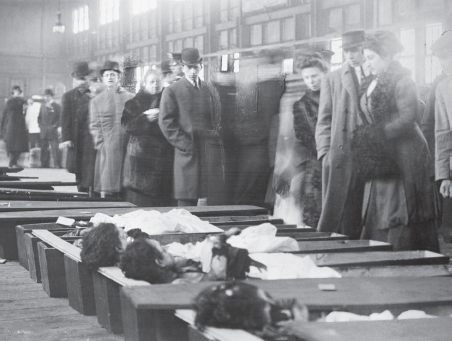Exploring American Histories: Printed Page 576
Document 18.3
Rose Schneiderman | The Triangle Shirtwaist Fire, 1911
On March 25, 1911, fire erupted in the Triangle Shirtwaist factory in lower New York City. Most of the company’s six hundred garment workers were immigrant women. The building had inadequate fire escapes and blocked exits, which resulted in the high death toll of 146 workers. This catastrophe aroused many New Yorkers to rally around factory reforms. In the aftermath of the fire, Rose Schneiderman, a Polish Jewish immigrant who had led a strike at the Triangle Shirtwaist Company in 1909, addressed a memorial gathering at the Metropolitan Opera House.
Explore

I would be a traitor to those poor burned bodies if I were to come here to talk good fellowship. We have tried you good people of the public—and we have found you wanting.
The old Inquisition had its rack and its thumbscrews and its instruments of torture with iron teeth. We know what these things are today: the iron teeth are our necessities, the thumbscrews are the high-powered and swift machinery close to which we must work, and the rack is here in the firetrap structures that will destroy us the minute they catch fire.
This is not the first time girls have been burned alive in this city. Every week I must learn of the untimely death of one of my sister workers. Every year thousands of us are maimed. The life of men and women is so cheap and property is so sacred! There are so many of us for one job, it matters little if 140-odd are burned to death.
We have tried you, citizens! We are trying you now and you have a couple of dollars for the sorrowing mothers and brothers and sisters by way of a charity gift. But every time the workers come out in the only way they know to protest against conditions which are unbearable, the strong hand of the law is allowed to press down heavily upon us.
Public officials have only words of warning for us—warning that we must be intensely orderly and must be intensely peaceable, and they have the workhouse just back of all their warnings. The strong hand of the law beats us back when we rise—back into the conditions that make life unbearable.
I can’t talk fellowship to you who are gathered here. Too much blood has been spilled. I know from experience it is up to the working people to save themselves. And the only way is through a strong working-class movement.
Source: Leon Stein, The Triangle Fire (New York: Carroll & Graf, 1962), 144–45.
Interpret the Evidence
Question
Why did Schneiderman reject the possibility of an alliance between the middle class and the working class?
Question
In Schneiderman’s view, what role did the government play in the oppression of working-class people?
Put It in Context
Question
What does this speech convey about working conditions for female laborers at the start of the twentieth century?